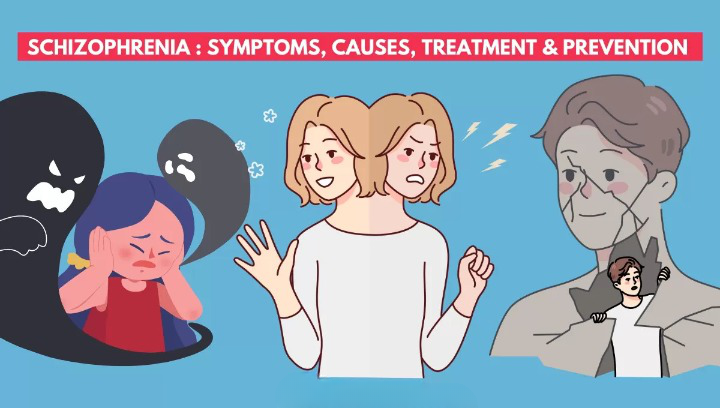
It is a complex disorder that impacts every aspect of a person's life, including their personality and family relationships. In this article, we will discuss the impact of schizophrenia on personality and family.
Personality and Schizophrenia:
Schizophrenia can have a significant impact on a person's personality. The symptoms of the illness, such as delusions, hallucinations, and disorganized speech and behavior, can affect the way a person interacts with others and how they perceive the world around them. For example, a person with schizophrenia may have difficulty trusting others and may become withdrawn and isolated. They may also struggle with emotional expression and have difficulty communicating their thoughts and feelings.
Research has found that people with schizophrenia often experience changes in their personality, particularly in the areas of extraversion, agreeableness, and conscientiousness. Extraversion, which is characterized by outgoingness and sociability, is often lower in people with schizophrenia. Agreeableness, which is characterized by compassion and empathy, is also often lower in people with schizophrenia. Conscientiousness, which is characterized by organization and responsibility, is also lower in people with schizophrenia.
These changes in personality can impact a person's ability to form and maintain relationships, as well as their ability to function in day-to-day life. However, it is important to note that not all people with schizophrenia experience changes “online counselling India” in personality, and those who do may experience these changes to varying degrees.
Family and Schizophrenia:
Schizophrenia not only impacts the person with the illness but also their family. Family members often play a critical role in the care and support of a person with schizophrenia. However, the illness can place a significant strain on family relationships.
The first challenge that families often face is the difficulty of recognizing and accepting that their loved one has schizophrenia. This can be particularly difficult if the person with schizophrenia is in denial about their illness or is experiencing delusions or hallucinations that make it difficult for them to recognize their symptoms.
Another challenge is the impact of the illness on family relationships. The symptoms of schizophrenia can make it difficult for the person with the illness to communicate effectively, which can lead to misunderstandings and conflict. Family members may also experience feelings of guilt, shame, and frustration as they struggle to understand and cope with their loved one's illness.
In addition, families often face practical challenges, such as managing medications and appointments, dealing with financial issues, and providing emotional support. These challenges can be overwhelming and can place a significant strain on family relationships.
Family support is crucial for individuals dealing with schizophrenia. It can provide a sense of stability, understanding, and comfort for individuals' best counsellor for the disorder. Family members can play a vital role in helping their loved ones manage their symptoms and achieve better outcomes. Here are some ways that family members can support a person dealing with schizophrenia:
Educate yourself about schizophrenia: One of the most important ways that family members can support a person dealing with schizophrenia is to educate themselves about the disorder. This can help family members understand what their loved one is going through and provide them with the tools they need to support their loved one effectively.
Encourage medication adherence: Medication is a crucial component of treatment for individuals with schizophrenia. Family members can help by reminding their loved ones to take their medication regularly, attending appointments with them, and helping to manage any side effects.
Encourage therapy and other treatments: In addition to medication, therapy, and other treatments can be helpful for individuals with schizophrenia. Family members can encourage their loved ones to attend therapy appointments, participate in support groups, and explore other treatment options that may be beneficial.
Provide emotional support: Dealing with schizophrenia can be incredibly challenging, and emotional support from family members can make a significant difference. Family members can provide a listening ear, offer words of encouragement, and provide emotional support during difficult times.
Help with daily tasks: Schizophrenia can make it difficult for individuals to complete daily tasks, such as cooking, cleaning, and managing finances. Family members can offer practical support by helping with these tasks when needed.
Foster independence: While it is important for family members to offer support, it is also important to encourage independence. This can help individuals with schizophrenia build confidence and improve their overall well-being.
Address stigma: Unfortunately, individuals with schizophrenia often face stigma and discrimination. Family members can play a crucial role in addressing stigma by educating others and advocating for their loved ones.
Overall, family support can make a significant difference in the lives of individuals with schizophrenia. By providing education, encouragement, emotional support, and practical assistance, family members can help their loved ones manage their symptoms and achieve better outcomes.
Conclusion:
Schizophrenia is a complex and challenging illness that impacts every aspect of a person's life, including their personality and family relationships. The symptoms of the illness can lead to changes in personality, such as decreased extraversion, agreeableness, and conscientiousness. These changes can impact a person's ability to form and maintain relationships and function in day-to-day life.
Schizophrenia also places a significant strain on family relationships. Families often face challenges related to recognizing and accepting the illness, communication, practical issues, and emotional support. However, it is important for families to seek support and resources to help them cope with these challenges.

No comments yet